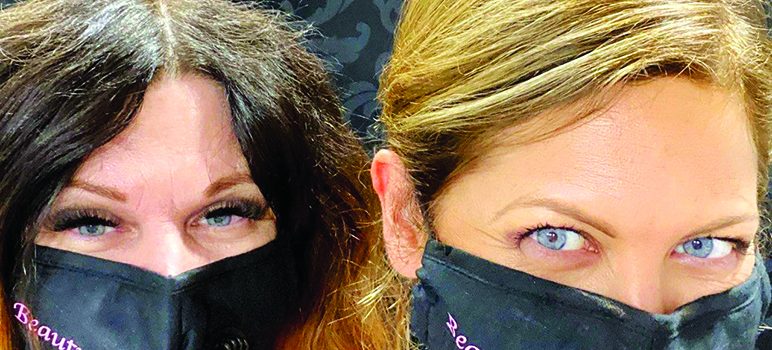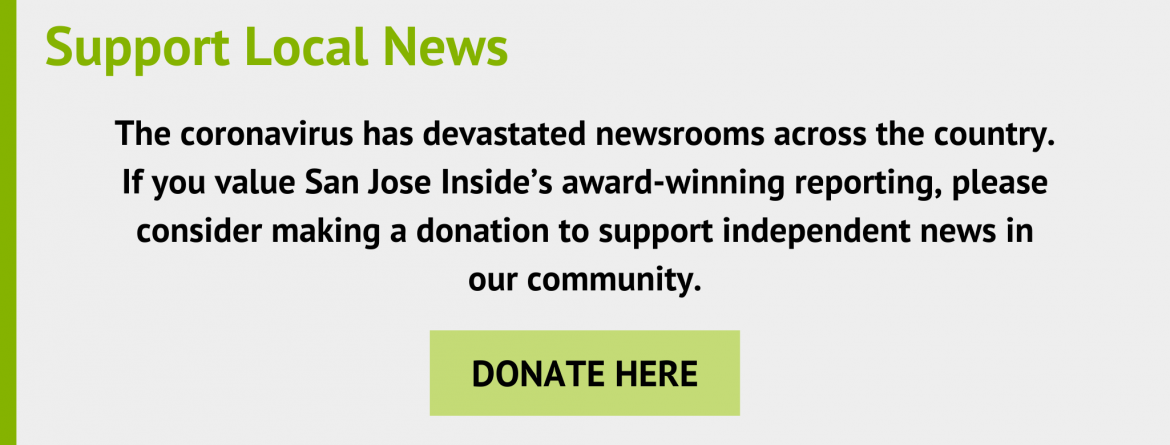Catrina Cavalero normally toasts the new year with a tidy sum from the holiday rush, when a surge of bookings double or triple her income from hairstyling.
But the most glamorous time of year—a mainstay of the $50 billion beauty industry—lost its verve when California ordered another lockdown in early December, slashing earnings for hairstylists, manicurists, aestheticians, massage therapists, plastic surgeons, barbers, herbalists and massage therapists.
“We lost our whole entire busy season,” Cavalero laments.
This week’s news of Gov. Gavin Newsom relaxation of pandemic-related business restrictions brought some relief for the 55-year-old owner of Midtown San Jose’s Beauty Bar 27. After a year of abrupt closures, cautious re-openings and a steady stream of bad press, Cavalero now wonders how she’ll regain the public’s trust and rebuild her clientele.
“Our whole industry has been defamed,” Cavalero says. “I’ve been in this business for 30 years and I have to basically start over. I think it’s great that they’re letting us go back to work again, but they’re not thinking about the aftermath.”
Split Ends
In a lawsuit filed Jan. 21 against Newsom and other state officials, the Professional Beauty Federation of California (PBFC) argues California singled out the industry because of its lack of lobbying power.
“The personal services sectors are the quintessential small business sectors,” PBFC attorney Fred Jones says in a phone call, “and yet, because we don’t have the same clout as Hollywood or big business, we have become the sacrificial lambs to the Covid gods.”
It’s a sacrifice borne disproportionately by minorities, he points out.
The state’s assiduous focus on salons and cosmetic services has hammered an industry composed overwhelmingly of women, immigrants and members of LGBTQ community. Of PBFC’s 621,000 dues-paying licensees, Jones says, more than 80 percent are female and 75 percent are first-generation immigrants.
“This is the profession that this governor has sacrificed,” he says. “That’s not very politically correct, is it?”
It doesn’t bode well for the state’s economic recovery either.
A recent report by accounting software firm Freshbooks found that woman-owned businesses take three times longer to recover from the pandemic’s financial setbacks than those owned by men. The same holds true for minority-owned businesses.
In Jones’ telling, the beauty industry’s financial woes began when Gov. Newsom blamed a Northern California nail salon for the first known case of community spread of the novel coronavirus. PBFC, reporters and other industry groups demanded data to support the assertion. State officials never provided that.
Newsom’s claim proved baseless. But the damage was done.
“What he didn’t realize was that he was throwing all this shade at our industry in the minds of Californians,” Jones says. “As a result, we’ve had a cumulative seven months of lockdowns. This is our third reopening after our third closure since March, and every time we reopen, there are less clients coming back because they’re picking up the message that this industry is unsafe.”
Rules for Thee
The PBFC lawsuit, which includes restaurant owners as plaintiffs, argues that lobbying money influenced the state’s double standard for certain industries.
When California initially defined what work it considered essential enough to continue at the start of the pandemic, it excluded Hollywood studios. A month later, the lawsuit points out, a new state order deemed “the entertainment industries, studios, and other related establishments” to be essential “provided they follow Covid-19 public health guidance around physical distancing.”
In November, Newsom carved out another exemption from his pre-Thanksgiving shelter-in-place order for TV and film production companies, allowing them to operate throughout the night instead of having to abide by the 10pm-to-5am curfew.
In early December, Los Angeles temporarily shut down a major coronavirus testing site to accommodate film crews shooting a remake of “She’s all That” starring a TikTok star named Addison Rae. Roughly 500 testing appointments were canceled. Public scrutiny over the decision prompted the L.A. mayor to intervene and reopen the testing station.
Meanwhile, the lawsuit goes on to state, Angela Marsden—owner of Pineapple Hill, one of the restaurant plaintiffs named in the case—posted a video of a film production setup allowed to stay open when her own outdoor dining patio was ordered to close.
“Ms. Marsden’s video went viral,” per the suit. “In her video, Ms. Marsden displays the hypocrisy, lunacy and total disparity between her own socially distanced outdoor set-up at her establishment juxtaposed by a similarly situated set-up containing outdoor tents and chairs associated with the NBC Universal production set for the series ‘Good Girls,’ which was allowed to proceed as essential work. In addition, hairstylists and makeup artists are explicitly allowed to perform their State Board of Barbering and Cosmetology licensed services in these Hollywood studios, while those same licensed professionals are prevented from doing the same services in a non-Hollywood studio salon.”
PBFC’s lawsuit calls the disparate treatment a direct result of the entertainment industry’s political influence.
“The disparity in exemptions ... is causally related to state officials, such as Newsom, supporting their campaign donors at the expense of small businesses and has nothing to do with science and data,” the complaint reads.
Of course, the lawsuit mentions Newsom’s infamous French Laundry fête, in which the governor was caught hobnobbing with influence peddlers for Netflix lobbyist Jason Kinney’s swanky birthday bash. Netflix, the complaint notes, has been allowed to operate during the latest round of closures—even as intensive care units filled to the brink and hospital capacity dwindled throughout the state.
“It is no secret,” the lawsuit reads, “that Hollywood lobbyists and insiders have leveraged their industry’s economic and political contributions to the state’s political powerbrokers and Democratic machine in order to insulate it from Covid-19 related regulations.”
Newsom’s press secretary, Daniel Lopez, tells San Jose Inside that the governor stands by the state’s public health mandates.
“We will vigorously defend against any lawsuit challenging public health orders implemented to preserve the ability of our medical system to provide needed care to all Californians,” he says. “We are confident the court will uphold the order, as have numerous courts that have recently considered similar challenges.”
Proof Positive
While state officials and their local counterparts drove home a narrative about salons and personal care services having some kind of inherent risk, research by the U.S. Centers for Disease Control and Prevention (CDC) suggested otherwise. The study published last summer found face masks may have prevented a pair of Covid-positive Missouri hairstylists from spreading the virus to as many as 140 clients.
Missouri’s Springfield-Greene County Health Department, which led the investigation, determined that requiring masks and the salon’s strict sanitation policies played a substantial role in curbing what could’ve been a huge outbreak.
Jen Erickson, founder CEO of Silicon Valley Apprenticeship Barbering/Cosmetology and a 25-year industry veteran, says clients should rest assured that salons are safe to patronize—certainly safer than a lot of other businesses allowed to stay open during shelter-in-place. Passing the California Board of Barbering and Cosmetology test requires 1,600 class-hours—about 1,000 more than needed to become a cop—and fluency in sterilization and cross-contamination.
“With the pandemic,” she says, “a lot of us even went above and beyond, retrofitting salons to make things safe, spending money even though we weren’t making any.”
For the first time, Erickson says, she took out a business loan—a 30-year mortgage to sustain her training program. “I’m not making any money right now,” she says. “I’m trying to work with students to find them other places to work, but it’s tough. Salons have shut down. I’ve lost apprentices—almost a third of them got pregnant and quit. And me, myself, I’m at a standstill.”
Show and Tell
If public health officials produced data that showed salons as high-risk for coronavirus outbreaks, that would be one thing, Jones says. But he has yet to see any from the state or local governments. What few numbers are available seem to back his suspicions about the shutdowns being less science-and-data-based than Newsom lets on.
Statistics released last month by the New York Gov. Andrew Cuomo’s office show that 74 percent of Covid cases for which there’s contact-tracing data available were attributed to household gatherings. Bars and restaurants accounted for just 1.43 percent of the spread. Salons and personal care services, just 0.14 percent.
Jones wants to see similar California data.
Lori Underwood, a 48-year-old Tracy resident who rents one of the two chairs at Cavalero’s Beauty Bar 27 in San Jose, has been asking for those figures in Santa Clara County. In a Jan. 7 email to county Supervisor Susan Ellenberg, she demands to know the rationale for liquor stores and big-box retailers being able to go about their business while personal care services cannot.
“My guests are now afraid to come into the salon,” Underwood wrote. “MANY know we are safe but many still follow the media hype. I have yet to recover all my guests or return to even close to the revenue I was at prior to these shutdowns. California is the only state with closed salons. Yes, our numbers are high, these shutdowns are NOT helping! IT’S NOT US! This feels very much like discrimination and this is decimating and ENTIRE industry. I'm sure you’ve heard all this already, and may even agree with me, but what I need is to be heard. I’m starting with you.”
The email concludes with a plea.
“Again,” it reads, “I ask, what are the numbers of salon infections and what is anyone doing to speak out for the beauty professionals for this injustice hit on our industry?”
Ellenberg responded by affirming Underwood’s concerns about the public health mandates being “financially untenable” and saying she’d been advocating for the cosmetic industry “for months, with mixed results.”
“I was very impressed with the safety measures salons were able to put in place,” Ellenberg wrote, “and, to answer your direct question, I have not been informed of any local outbreaks directly associated with salons as spreaders.”



You all got the shaft, and it was unfair. Im glad youre speaking up and not playing nice like these landlords who just spout platutudes of gratitude to those that crush them for their malignant purposes.
I think he may well be a “kulak” under your definition.
He’s viewed and treated by the Communists as a class enemy, and whenever he is “allowed” to offer his opinions he is shadowed and harassed by a party sympathizer. One who is desperate to find his true identity and expose his wrongful ways for all the Party to see and correct.
I say he is a “kulak”
We’ve been spoon-fed lie after lie, from the top all the way down to local governments. Malfeasance abounds.
I for one have not bought any of the lies. I’ve done the math. We keep hearing it’s all OUR fault. Blaming the spike on family gatherings (everyone I’ve talked to spent Thanksgiving, Christmas, and NYE in their homes with people they live with – or alone). Then we’re told there was MASSIVE travel during the holidays. Where? We were told to stay put! And we did.
Just wait. They’ll blame the next spike on Super Bowl parties, or Valentine’s Day dinners out, or St. Patrick’s Day, or Easter – ad nauseum.
I’m not scared of being around people, dining inside, large groups of people (heaven forbid), hugging (remember that?). I LIVE. Mammals are not meant to be without interaction with other mammals. At least most them need that interaction. Humans NEED to be and feel like an active part of a living community.
Time we take our power back.
M
Best comment of the day, Im with you!